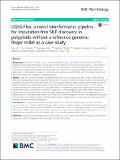| dc.contributor.author | Peng Qi, Davis Gimode, Dipnarayan Saha, Stephan Schröder, Debkanta Chakraborty, Xuewen Wang, Mathews M Dida, Russell L Malmberg, Katrien M Devos | |
| dc.date.accessioned | 2020-09-01T06:31:22Z | |
| dc.date.available | 2020-09-01T06:31:22Z | |
| dc.date.issued | 2018-12-01 | |
| dc.identifier.citation | 9 | en_US |
| dc.identifier.uri | https://repository.maseno.ac.ke/handle/123456789/2630 | |
| dc.description.abstract | Research on orphan crops is often hindered by a lack of genomic resources. With the advent of affordable sequencing technologies, genotyping an entire genome or, for large-genome species, a representative fraction of the genome has become feasible for any crop. Nevertheless, most genotyping-by-sequencing (GBS) methods are geared towards obtaining large numbers of markers at low sequence depth, which excludes their application in heterozygous individuals. Furthermore, bioinformatics pipelines often lack the flexibility to deal with paired-end reads or to be applied in polyploid species. | en_US |
| dc.publisher | BioMed Central | en_US |
| dc.subject | Chromosomal rearrangements;Eleusine coracana;E. indica;Finger millet;Genetic mapping;Genotyping-by-sequencing (GBS) | en_US |
| dc.subject | GBS-pipeline;Paired-end reads;Polyploid;SNP calling | en_US |
| dc.title | UGbS-Flex, a novel bioinformatics pipeline for imputation-free SNP discovery in polyploids without a reference genome: finger millet as a case study | en_US |
| dc.type | Article | en_US |

